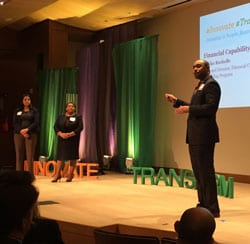The Financial Capability & Asset Building (FCAB) initiative was highlighted Tuesday during a celebration showcasing four Washington University in St. Louis initiatives funded by a $5.3 million gift from Wells Fargo Advisors. 
In 2012, Wells Fargo Advisors made the commitment to the initiatives with the goal of developing programs that would make a lasting impact on the St. Louis region and on society at large. Chancellor Mark S. Wrighton called the gift an “investment in transformation” during the event, “Innovate, Accelerate, Transform: Investing in People, Businesses and Communities,” at Knight Hall.
The Center for Social Development (CSD) at the Brown School launched the FCAB initiative in 2012, seeking to ensure that all Americans, particularly low- and moderate-income families, have access to basic financial education and guidance. To begin this process, CSD developed the FCAB curriculum to train social workers and other human service professionals to help families cope with immediate financial problems, take basic steps toward financial security, and refer clients to other professionals for more in-depth financial guidance when needed.
Wrighton praised FCAB as an “initiative that reaches well beyond St. Louis, influencing the field of social work around the country in a profound way.”
“Twelve institutions of higher education are participating in this, specifically those who serve African-American, Native American and Hispanic college students,” Wrighton said. “This program has an exponential impact, transforming college students into social work leaders who can more effectively manage their own finances while assisting thousands of families to do the same over the course of their careers.”
During FCAB’s portion of the event, Project Director Mike Rochelle said the initiative lays the groundwork for training a generation of human service professionals with basic financial knowledge and skills. In the process, he said, families who today have no financial guidance whatsoever can begin progressing through the asset-building continuum.
Rochelle showed a video about FCAB, featuring among others CSD Director Michael Sherraden and Project Director Gena McClendon. Rochelle also introduced two FCAB enthusiasts: Kim Downing, assistant professor at Elizabeth City State University, and Diana Cardenas, a student pursuing her master’s degree in social work from California State University, Los Angeles.
Elizabeth City State University (ECSU) is a small historically black college in rural North Carolina. The university chose to be part of FCAB because the students need it, Downing said. Most come from the 21 surrounding counties, where about a third of the population lives below the federal poverty level.
“Most of them are first-generation college students,” Downing said.
Her role is to prepare students to be effective social work practitioners, and the FCAB curriculum helps them assist clients with issues that are common in rural communities with high rates of poverty, Downing said. For example, one student who works with the Guardian ad Litem program is using FCAB content to help a single mother develop a budget as part of her effort to regain custody of her child.
“Because we love this curriculum so much,” Downing said, “we have established the FCAB Resource and Information Center to work with the community. Currently we’re providing workshops with churches and other community organizations.”
She added, “We want to say thank you for this partnership because not only has it assisted our students professionally but also personally.”
Cardenas was introduced to FCAB about a year ago, after she learned that about two thirds of the wealth held by Latino households was wiped out during Great Recession. Cal State Assistant Professor Joanna Doran, who was in the video and in the audience Tuesday, taught Cardenas about financial fragility, particularly as it pertains to Latinos in East Los Angeles engaged in buying a home. Cardenas said she has learned the difference between income poverty and asset poverty, and how crucial asset building is.
“I’m a first-generation college student,” Cardenas said, “and I really want to use this [FCAB] information not only to help myself but to apply it and to work with clients in the field of social work.”
In addition to FCAB, the initiatives are: the Skandalaris Center Internship Program; the Wells Fargo Advisors Center for Finance and Accounting Research at Olin Business School; and the Olin/United Way Board Fellows program.
“Wells Fargo Advisors is committed to serving the communities in which our team members and clients live, work and raise their families,” Mary Mack, president of Wells Fargo Advisors, recently told the Record, the university’s digital publication. “The four initiatives we support at Washington University match our goals of creating opportunities, promoting economic prosperity and advancing financial education.”
Visit CSD’s Flickr to see more photos from the event.